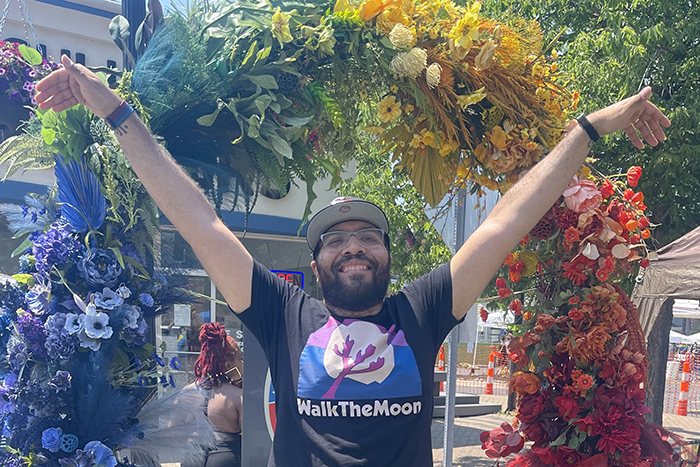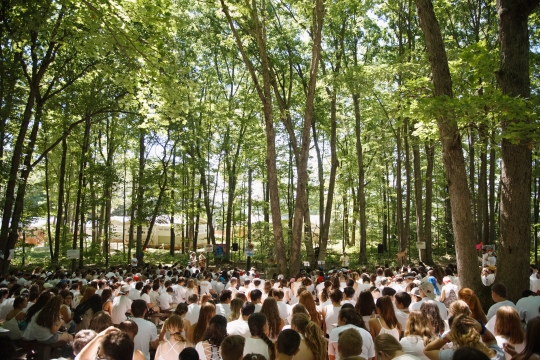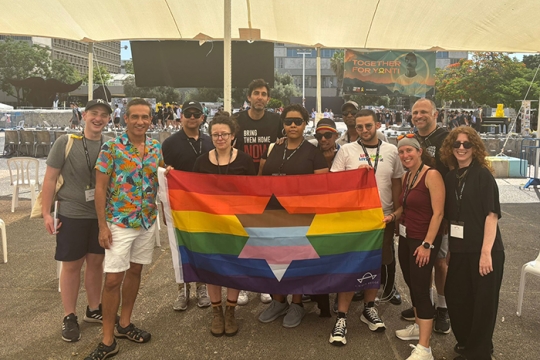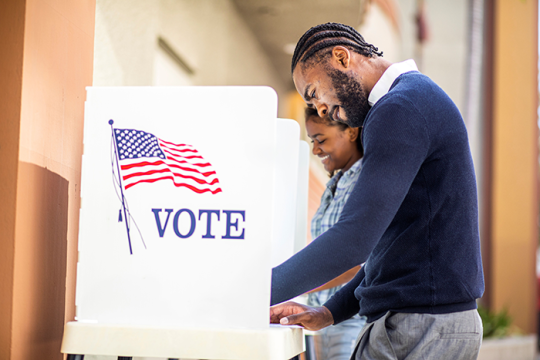
I wasn't born into the Jewish community. Rather, I was raised in the African Methodist Episcopal (AME) Church. From the age of five until I was 14, I attended church nearly every Sunday with my family. During services, one of the speakers would always recite the Ten Commandments. Because I was raised to revere God (and Jesus) and fear burning in hell for all eternity, I took the Commandments seriously. However, one of the Commandments deeply resonated above all others: "You shall not bear false witness against your neighbor," meaning "You shall not lie" (Exodus 20:13). This affected me most because I was lying to others and myself about a core aspect of my identity: my bisexuality.
My whole life, I've known I was different. I grew up having crushes on both girls and boys, but I was taught at an early age that liking boys was an affront to the eyes of God. So, I did what a lot of other queer kids growing up in the 90s did: I denied my identity. I put on a facade of straightness, hoping to "fake it till I made it" and willed myself straight. I would only talk to my family about girls I liked and never about boys. I tried to convince myself that thinking about boys was just a "phase" I was going through; that God was just testing me to see how faithful I was. I didn't want to disappoint those closest to me and I didn't want to anger God by engaging in a "sinful" lifestyle (even though, ironically, I was going against one of the Ten Commandments in the process).
I continued this lie until my early 20s, when I moved from my hometown near Cincinnati to Chicago. Now that I was free to do as I pleased, I gave myself permission to go on dates with other men. However, I was still not ready to properly define myself as bisexual. I told myself that I was "heteroflexible," or "mostly straight," a remnant of the lying and self-hatred I harbored as a child. It wasn't until I was 28 that I finally gained the courage to come out as a proud bisexual man; the catalyst to do so was coincidentally a version of the same thing that kept my identity a secret: religion.
I converted to Judaism after learning more about it at my college, Miami University. One of my best friends converted to Reform Judaism with his family and I would often go to his house for Shabbat dinners or celebrate the holiday at MU Hillel (an organization of which I am now a proud board member). A lot of things attracted me to Judaism: the emphasis on social justice, the imperative to question and debate, etc., but one thing that especially stood out to me was the fact that most branches of Judaism not only believe that it's not a sin to be queer, but that it is actually something to celebrate. Meeting queer Jews at Hillel was the spark that would later allow me to slowly come out of the closet and stop lying to others and myself about that part of my identity.
Judaism takes truth very seriously. Throughout our texts, it is reiterated that we are to live a life of truth. For example, Zechariah 8:16 says, "These are the things you are to do: Speak the truth to one another, render true and perfect justice in your gates." The Talmud also makes it clear: "Rather it is to say that your 'yes' be yes and your 'no' be no. [Jewish scholar] Abaye said, 'That means one should not speak one thing with the mouth and another with the heart"' (Bava Metzia49a:6).
As a Reform Jew, I take this to mean that God wants me to live out my truth in every way I can, even when that means being honest to myself and to others that I am bisexual. This is in part because queer Jews have always been a part of what makes Judaism such a beautiful religious civilization; our identities deserve to be acknowledged and celebrated. Many people suggest that King David was bisexual and find proof in the Bible: As David said to Jonathan, "Your love was wonderful to me. More than the love of women" (2 Samuel 1:26). While some read this verse to say that David and Jonathan's love was platonic, I choose to see this as an indication of David's inherent queerness, that even one of the greatest leaders of the Jewish people did not live a life espousing heteronormativity.
I say all of this not to judge anyone who is still in the closet. There are, unfortunately, many cases in which it is safest to lie or keep one's queer identity a secret. However, I want those reading who are quietly queer to know one thing: even if you can't be truthful to others about your identity, you still deserve to be truthful with yourself. There is nothing wrong with your identity. You are not being "tested" by God to turn yourself into something you're not. You are beautifully made b'tzelem Elohim / in God's image, and your queerness is no exception (yes, God is also queer). As you navigate through life, only you can determine the best time to live out your truth with other people. Until that day comes, remember that you are not alone; God loves you and wants you to honor your truth, even if it's just with yourself.
Related Posts

Reflections

Hope and Pride in Be’er Sheva

